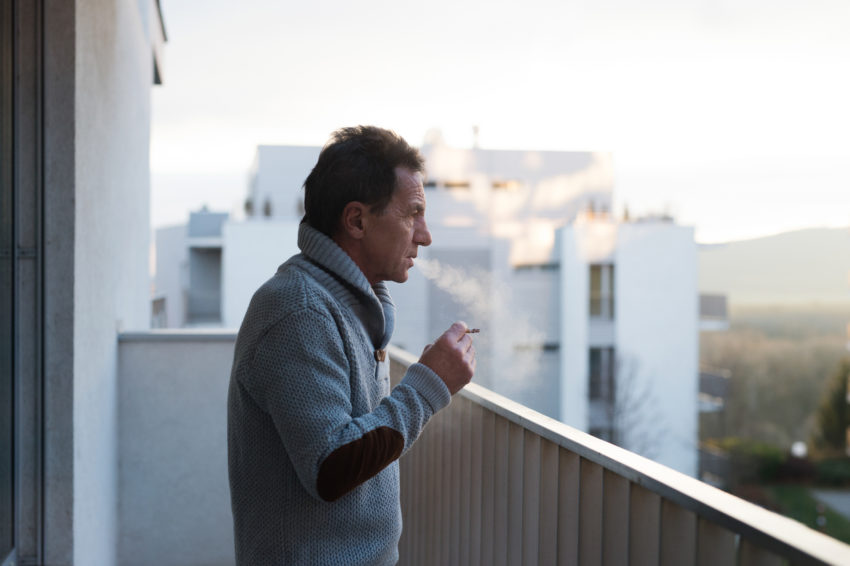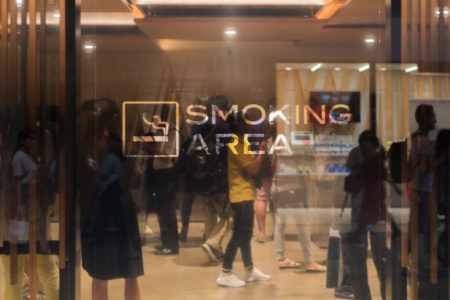
Share On Social!
More and more Californians are working toward a tobaccoless future.
In the city of Crescent City, Calif., residents will no longer be able to smoke in multi-unit housing. A new ordinance, recently passed by the City Council, aims to reduce the harmful toxins non-smokers face when facing secondhand smoke inside their apartments or condos.
The city joins a list of over 60 other California cities with similar policies.
Secondhand smoke is linked to cancer and heart disease. There is even data to suggest that some forms of exposure are more harmful than other, such as sidestream exposure — a mix of mainstream smoke, the smoke exhaled out by a smoker, and sidestream smoke from the burning tobacco product.
“[Sidestream] smoke has higher concentrations of cancer-causing agents (carcinogens) and is more toxic than mainstream smoke,” according to the American Cancer Society. “It also has smaller particles than mainstream smoke. These smaller particles make their way into the lungs and the body’s cells more easily.”
The Ban on Smoking in Multifamily Dwellings in Crescent City
There is a 39.4% Latino population in Crescent City.
So Crescent City’s policy will help Latino and all families who are exposed to secondhand smoke.
It’s one of the reasons why advocates in the city were pushing for this change. It’s one of the reasons why officials worked so hard to get the policy through.
Nationally, one quarter of U.S. residents—approximately 79 million people—live in multifamily properties, such as apartment buildings and condominiums.
Most are nonsmokers. But about half are exposed to secondhand smoke.
Inside multifamily dwellings, secondhand smoke can travel through doorways, halls, windows, ventilation systems, electrical outlets, and gaps around fixtures and pipes.
“Based on several studies, an estimated 44 percent to 53 percent of multi-unit housing residents that do not allow smoking in their home, have experienced secondhand smoke infiltration in their home from elsewhere in or around the building,” according to the American Lung Association.
Still, not everyone is happy about the changes, including one of the city’s council members, Jason Greenough.
“You can already go talk to your landlord — you can already appeal to them. If there’s health issues, you can appeal to the health department. You don’t have to put a code on the books in Crescent City. There are laws on the books in California already to protect people,” Greenough told Lost Coast Outpost. 
But health and industry experts disagree with this logic.
Smoke-free policies are the only way to prevent exposure to secondhand smoke in multifamily units, according to HUD and ChangeLab Solutions.
“Secondhand smoke flows between units through air filtration systems and other means. It cannot be contained. Multifamily buildings share air ducts or vents, which means a lit cigarette in one unit can easily transmit tobacco smoke into another unit,” according to HUD. “Even in modern buildings designed to minimize air transfer among units, there is no way to guarantee that smoke will not be blown from unit to unit through open windows. A recent public housing study identified movement of smoke among units and evidence of improved air quality in buildings with smoke-free policies.”
The American Society of Heating, Refrigerating, and Air Conditioning Engineers (ASHRAE) agrees.
“At present, the only means of effectively eliminating health risk associated with indoor exposure is to ban smoking activity,” according to their 2010 position statement that they reaffirmed in 2019.
Without such a policy, multifamily tenants are exposed to numerous harms.
“Most know that smoking harms the smoker, but few realize there is solid research linking secondhand smoke to asthma, SIDS, COPD, recurrent ear and pulmonary infections, many cancers, and the possibility to spread COVID-19,” Dr. Claudia Miller, leader of the Hoffman TILT (Toxicant-induced Loss of Tolerance) research program at UT Health San Antonio, said. “The personal, social, and financial costs of COVID-19 and these secondhand-smoking conditions are incalculable.”
Those dangers are why local leaders are taking such decisive action, according to Crescent City Attorney Martha Rice.
“There are often requirements for noticing or to say that you need to provide a remedy for this, that or the other thing, but to have very specific terms, it’s not very common,” Rice told Lost Coast Outpost. “(Other cities) have been justified on both using the city’s constitutional police powers and the fact that state law does not specifically cover this particular area. It’s not preempted by some other provision in state law.”
What You Can Do
Taking action is necessary, according to Amber Wier, a health education coordinator for the Del Norte County—where Crescent City is—Tobacco Use Prevention Program.
“[One tenant] called public health and we called the landlords,” Wier told Lost Coast Outpost. “Her manager tried to seal the apartment so her kids’ toothbrushes didn’t smell like second-hand smoke. The neighbor didn’t care and the owner of the complex lived in Oakland and he didn’t care. She ended up moving to Klamath while still paying rent on her apartment here in Crescent City because her landlord wouldn’t allow her out of their lease agreement.”
More and more cities are working to pass bans on smoking in multifamily housing.
Such a ban went into effect in Concord, California on Jan. 1, 2021. San Francisco city leaders took a first step toward a ban in December 2020, but hurdles remain.
The best way for someone to protect themselves and others is by quitting smoking.
You can get help from the free Quitxt Program from Ramirez’ team at UT Health San Antonio.
The Quitxt program, developed with the support of the Cancer Prevention and Research Institute of Texas, is a bilingual service for smartphones that sends messages via text or Facebook Messenger to help coach and encourage people on the journey toward smoking cessation.
Also, download the Salud America! Action Pack “Help Your City Adopt Smoke-Free Multifamily Housing!”
The action pack will help you engage local leaders in exploring a smoke-free multifamily housing policy for common areas and individual units.
“Experts say a smoke-free multifamily housing policy can protect the health of tenants and staff of apartments from secondhand smoke, as well as save property owners money in unit maintenance, fire prevention, insurance, and reduced legal liability,” said Dr. Amelie G. Ramirez, action pack creator and director of the Salud America! Latino health equity program at UT Health San Antonio.
By The Numbers
142
Percent
Expected rise in Latino cancer cases in coming years



